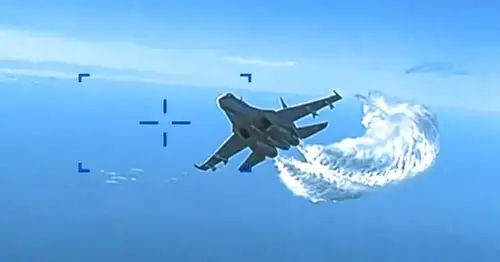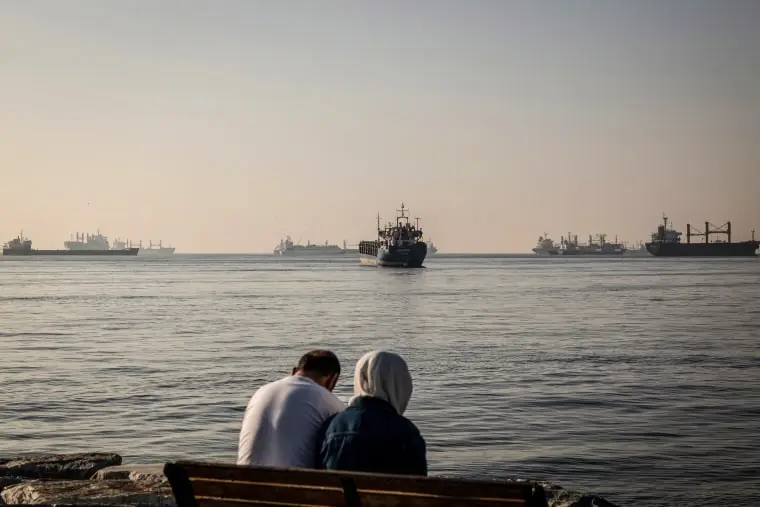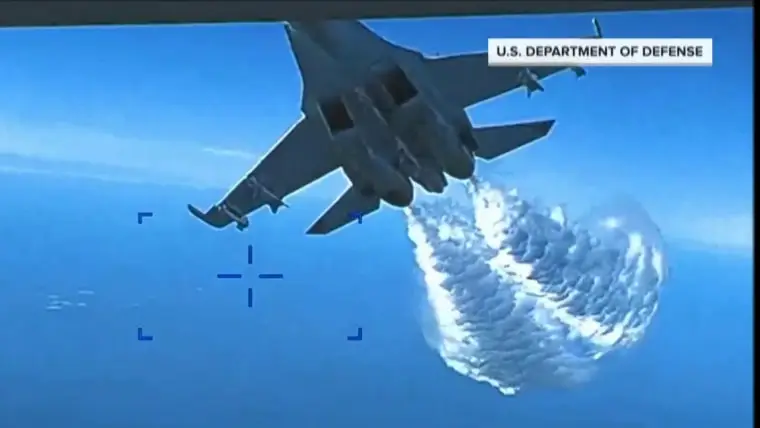
Why the Black Sea is such a flashpoint between the U.S. and Russia
A military drone may not be the only thing the U.S. is missing in the Black Sea.
The dramatic encounter with Russian fighter jets this week drew the world’s attention to the body of water that has been central to the war in Ukraine.
But it also raised a key security question for Washington and its allies: Is there a clear strategy for a critical waterway that has long been central to the rivalry between Moscow and the West and could now become a major flashpoint?
Lawmakers and former military officials said the answer is of particular concern as a deal to let critical supplies of grain exit Ukraine’s ports on the Black Sea sits in the balance and Russia’s fleet uses the area as a launchpad for attacks against Ukrainian cities.
Depths of conflictDescribed by some as “a potential powder keg,” the Black Sea is slightly larger than California and has six countries on its coast: NATO members Turkey, Romania and Bulgaria as well as Georgia and Ukraine, which are considered U.S. partners but are not part of the alliance.
And then there’s Russia.
At one time, the U.S. helped allies match its presence in the Black Sea and performed exercises there, but the Biden administration pulled American ships from the area when it appeared the Russians were preparing to invade Ukraine. Turkey is now stopping warships from entering the sea through the Bosphorus Strait, which it controls and can close during times of war.
That means the U.S. has no means to recover the drone, which the U.S. said it brought down in the Black Sea on Tuesday after a Russian fighter jet collided with it.
“It points to the lack of a comprehensive approach to a region that is important, not just to our allies and to the countries bordering the Black Sea, but it’s important to the United States’ security as well,” Sen. Jeanne Shaheen, D-N.H., told NBC News of America’s diminished military role in the area.
The U.S. does not have a ship in the area to recover the wreckage, and the only NATO ally that borders the Black Sea and has a navy robust enough to potentially approach the crash site is Turkey, which has tried to remain relatively friendly with Moscow in its war with Ukraine.
Gen. Mark Milley, the chairman of the Joint Chiefs of Staff, told reporters Wednesday that there likely was not much debris to recover anyway. The drone had limped along to an area where depths reach as far as 5,000 feet, and the U.S. military had ensured that its data banks were wiped, he said.
Russia has blamed the U.S. for the confrontation, denying that its jet came into contact with the drone and accusing Washington of provocation by conducting surveillance near Russian airspace.
Russian President Vladimir Putin has made expanding Moscow’s presence a priority, annexing the Crimean Peninsula — the historic home of Russia’s Black Sea Fleet and a bedrock of the Kremlin’s ability to project its power across the region — and long meddled in neighboring countries like Georgia.
Shaheen, who chairs the Senate Foreign Relations Subcommittee on Europe and Regional Security Cooperation, and others said that this week’s drone incident highlighted that the U.S. needs to outline a plan for its approach to defending the Black Sea.
The drone encounter pushed Shaheen, who visited a NATO airbase in Romania last month, to reintroduce a bill with Sen. Mitt Romney, R-Utah, that would require the Biden administration to produce an interagency strategy within 180 days to deepen U.S. economic and military ties with countries in the region.
“There’s been a great deal of bipartisan interest in it because — between the war in the Ukraine, this incident with the drones, what’s happening with the shipping lanes — it’s very clear how important the region is,” Shaheen said. “And most of the countries who border the Black Sea are our allies, and it’s important now for us to show how we support our allies.”
The State Department and National Security Council did not respond to requests for comment.
A weak point in the water?
Former national security officials who have operated in the region said that the level of U.S. and NATO investment in the Black Sea does not match its strategic importance. They said that, despite NATO rhetoric, Western activity in the region began to drop after Moscow seized Crimea.
Glen Grant, a former British officer who has worked as a military trainer and consultant for Ukraine and Bulgaria, said that the Black Sea is a particular weak point for NATO’s eastern flank.
“There’s no NATO on that side because of the weakness of Bulgaria and Romania and the intransigence of Turkey,” he said. “Because of that, you don’t have a NATO presence in the Black Sea.”
A NATO official, who asked to remain anonymous to speak freely, emphasized that the Black Sea region is of “strategic importance” to the alliance, noting that its members had reinforced NATO’s presence in response to the Kremlin’s Crimea annexation in 2014 and full-scale invasion of Ukraine last year.
Ben Rhodes: Russia sees Black Sea as ‘their real estate'
March 16, 202308:02The official said NATO has led greater air policing missions out of Romania and Bulgaria, placed more air and missile defense systems in Romania and Turkey, and stationed new battlegroups in the region.
Steven Horrell, a former U.S. naval intelligence officer who studies the region for the Center for European Policy Analysis, a Washington-based think tank, said Turkey — which serves as NATO’s southern bulwark and has one of the most powerful militaries in the alliance — “has to be central” to any strategy regarding the Black Sea.
The U.S. must find a way to make it a more reliable partner as Washington also develops closer ties to the likes of Romania and Bulgaria, he said.
There appeared to be some movement toward greater cooperation, at least, as the presidents of Romania and Bulgaria met in Sofia and signed a pact to boost ties on Wednesday.
“We have to rely on the three NATO allies [Bulgaria, Romania and Turkey] and the Black Sea states to lead,” Horrell said. “It has been challenging for the three of them to come together in one voice in the same way that, for instance, the Baltic States have done.”
The foreign ministries of Bulgaria, Romania and Turkey did not respond to requests for comment.

Looming over everything is the grain deal, which expires on Sunday.
Brokered by Turkey and the United Nations, the pact has allowed for Ukraine — one of the world’s largest exporters of grain, sunflower oil, wheat and corn — to stabilize world markets and ensure global food security. It’s also brought much-needed cash to the country as it fights Russia’s invasion.
During the renewal process, however, Russia has attempted to push for greater concessions and to shorten the pact from 120 days to 60, which has raised fears the deal could be scuttled.
Visiting a United Nations logistics warehouse in Addis Ababa that stores some of the Ukrainian wheat that has reached the Ethiopian capital, Secretary of State Antony Blinken on Wednesday declared it vital that the agreement be renewed.
“We can see the impact if that doesn’t happen, because it literally means that what you’re seeing right here …won’t get to many other places,” Blinken told reporters.
Source: https://www.nbcnews.com/news/world/black-sea-us-russia-flashpoint-drone-ukraine-war-rcna75269







